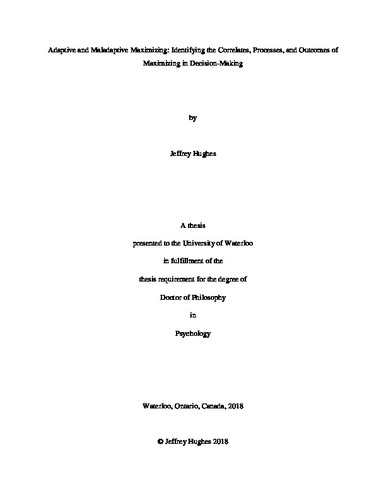| dc.description.abstract | Research on the affective outcomes of maximizing has been mixed, with some research indicating that people who seek the “best” option across decisions report lower happiness and life satisfaction, and greater depression and regret. However, other research has suggested the opposite, finding that maximizing is associated with higher life satisfaction, happiness, optimism, and self-efficacy. Part of the reason for these discrepant results is that researchers have often disagreed on how to define maximization, and as such previous measures of the construct have grouped together subscales that differ in their relationships with affective experiences. Drawing from motivation research, I distinguish between the goals (i.e., “high standards” or wanting the best), strategies (e.g., alternative search), and possible outcomes (e.g., decision difficulty) associated with maximizing. This distinction is used to argue that maximizing may be meaningfully divided into separate types: a more adaptive type of maximizing not associated with affective costs, and a more maladaptive type associated with greater affective costs. I also argue that the motivational orientations of promotion focus and assessment mode can reliably distinguish between these types. Six studies provide evidence for these distinct types, to gain insight into when maximizers do or do not experience affective costs when making decisions. In Study 1, I show that subscales of maximizing are differentially associated with various general motivational factors. Study 2 presents research to show that promotion focus and assessment are both associated with the goal of wanting the best, yet assessment (not promotion) is related to the use of alternative search strategies. In Study 3, I use latent class analysis to cluster participants into distinct groups based on maximizing subscales, and show that these predict affective costs on a discrete decision task. In Study 4, I pit high standards and alternative search against each other to demonstrate that it is the strategy used, not the high standards goal, that mediates the relationship between assessment and frustration on a discrete decision task. In Study 5, I provide evidence that one reason why alternative search shows connections with affective costs may be particularly due to the reconsideration of previously dismissed options. Finally, Study 6 extends this research outside the domain of consumer decisions, demonstrating that these relationships hold in the context of participants’ own important life decisions. After presenting these studies, I discuss the implications of this research for the maximizing and decision-making literatures, and for the literature on motivation and self-regulation. | en |

